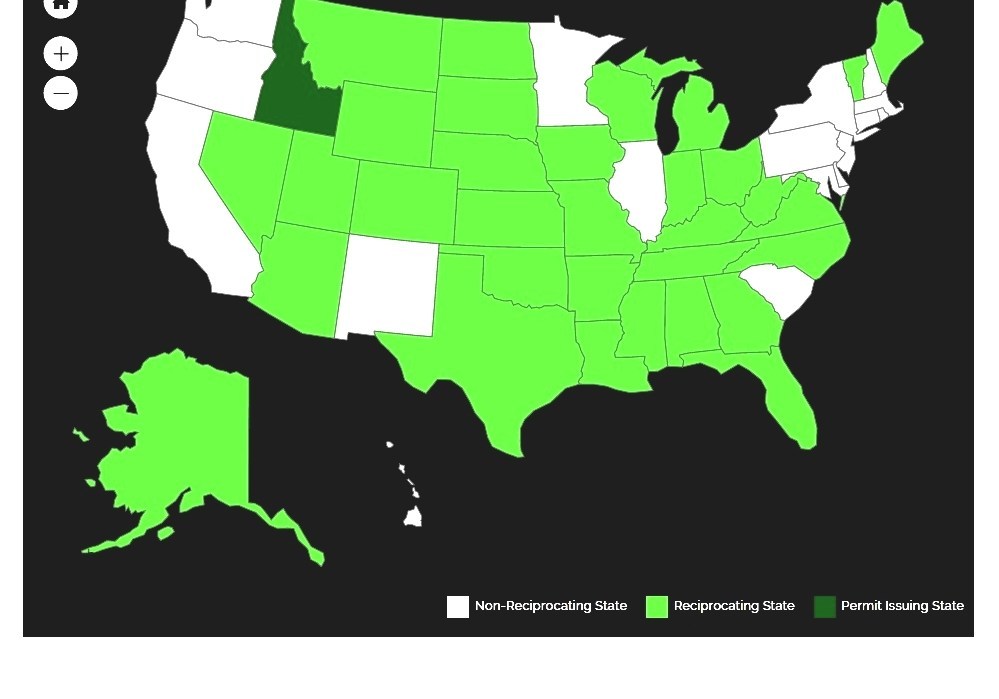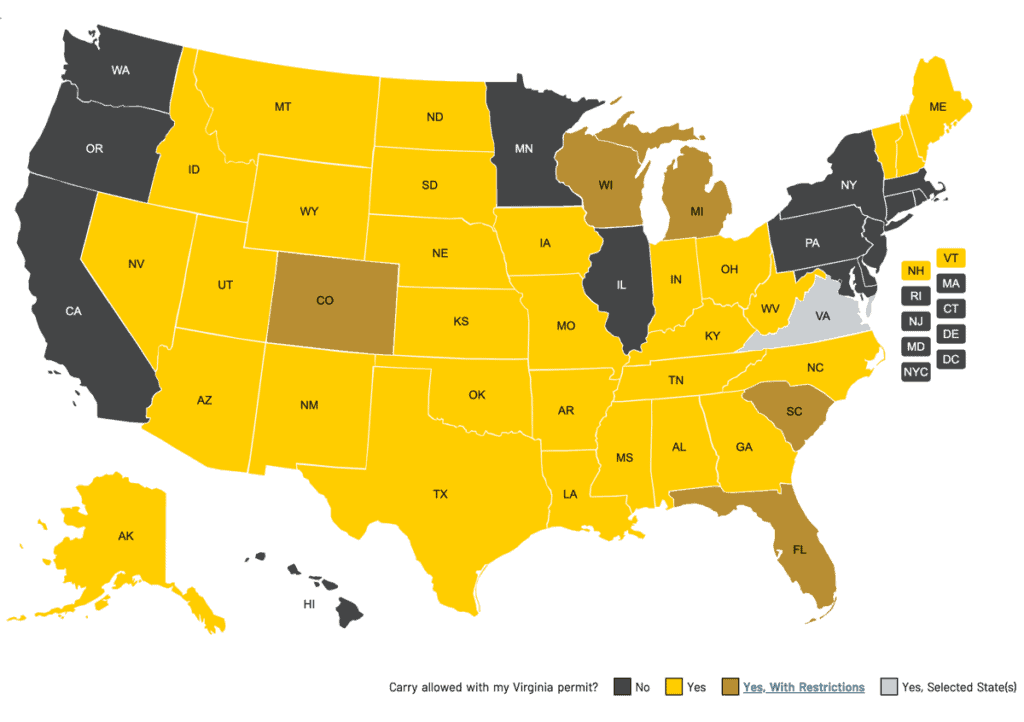Navigating The Complexities Of Concealed Carry Reciprocity: A Comprehensive Guide To Virginia’s Position
Navigating the Complexities of Concealed Carry Reciprocity: A Comprehensive Guide to Virginia’s Position
Related Articles: Navigating the Complexities of Concealed Carry Reciprocity: A Comprehensive Guide to Virginia’s Position
Introduction
With great pleasure, we will explore the intriguing topic related to Navigating the Complexities of Concealed Carry Reciprocity: A Comprehensive Guide to Virginia’s Position. Let’s weave interesting information and offer fresh perspectives to the readers.
Table of Content
Navigating the Complexities of Concealed Carry Reciprocity: A Comprehensive Guide to Virginia’s Position

The ability to lawfully carry a concealed firearm across state lines is a complex issue, often governed by a patchwork of individual state laws. This intricate web of regulations can be particularly challenging for gun owners seeking to travel with their firearms. Understanding the nuances of concealed carry reciprocity is crucial for individuals seeking to exercise their Second Amendment rights while traveling. This article delves into the intricacies of Virginia’s concealed carry reciprocity map, providing a comprehensive overview of the state’s position and its implications for gun owners.
Understanding the Concept of Concealed Carry Reciprocity
Concealed carry reciprocity refers to the recognition of concealed carry permits issued by one state by other states. In essence, it allows a permit holder from one state to legally carry a concealed firearm in another state, as long as that state has a reciprocity agreement with the permit holder’s home state.
Virginia’s Stance on Concealed Carry Reciprocity
Virginia’s approach to concealed carry reciprocity is multifaceted, reflecting a balance between upholding its own laws and acknowledging the rights of permit holders from other states. The state recognizes concealed carry permits from various jurisdictions, but not all. This nuanced approach necessitates careful examination of the specific states and their respective reciprocity agreements with Virginia.
Virginia’s Reciprocity Map: A Detailed Breakdown
Virginia’s concealed carry reciprocity map is dynamic, subject to change as states revise their own concealed carry laws. It is essential to consult updated resources for the most accurate information. As of the date of this article, Virginia recognizes concealed carry permits from the following states:
- Full Reciprocity: Alabama, Alaska, Arizona, Arkansas, Colorado, Florida, Georgia, Idaho, Indiana, Iowa, Kansas, Kentucky, Louisiana, Michigan, Mississippi, Missouri, Montana, Nebraska, New Hampshire, New Mexico, North Carolina, North Dakota, Ohio, Oklahoma, Pennsylvania, South Carolina, South Dakota, Tennessee, Texas, Utah, Vermont, West Virginia, Wisconsin, Wyoming.
- Limited Reciprocity: Delaware (only for active duty military personnel), Maryland (only for retired military personnel), Minnesota (only for active duty military personnel), New Jersey (only for active duty military personnel and retired law enforcement officers), Oregon (only for active duty military personnel), Washington (only for active duty military personnel), and the District of Columbia (only for active duty military personnel and retired law enforcement officers).
- No Reciprocity: California, Connecticut, Hawaii, Illinois, Massachusetts, New York, Rhode Island.
Key Factors Influencing Virginia’s Reciprocity Map
Several factors contribute to the complex tapestry of Virginia’s concealed carry reciprocity map. These include:
- State Laws: Virginia’s concealed carry laws, including the requirements for obtaining a permit, influence which states’ permits are recognized.
- Reciprocity Agreements: Bilateral agreements between states form the backbone of reciprocity. Virginia may enter into formal agreements with other states, outlining the terms of mutual recognition of concealed carry permits.
- Constitutional Carry: States that have adopted constitutional carry laws, which allow individuals to carry concealed firearms without a permit, may not have formal reciprocity agreements with Virginia.
- Federal Laws: Federal laws, such as the Law Enforcement Officers Safety Act (LEOSA), impact concealed carry reciprocity, particularly for retired law enforcement officers.
The Importance of Staying Informed
The dynamic nature of concealed carry reciprocity necessitates staying informed about the latest updates to Virginia’s reciprocity map. Changes in state laws, new reciprocity agreements, and evolving legal interpretations can alter the landscape of concealed carry rights.
Accessing Up-to-Date Information
- Virginia Department of State Police: The Virginia Department of State Police website offers official information on concealed carry reciprocity.
- National Reciprocity Database: The USCCA’s National Reciprocity Database provides a comprehensive overview of concealed carry reciprocity across all states.
- Gun Rights Organizations: Organizations like the NRA and the Gun Owners of America provide updates on concealed carry laws and reciprocity agreements.
FAQs about Virginia’s Concealed Carry Reciprocity
Q: What types of concealed carry permits does Virginia recognize?
A: Virginia recognizes concealed carry permits issued by other states that have a reciprocity agreement with Virginia. These permits can be issued by state agencies or local law enforcement.
Q: Do I need to register my firearm in Virginia if I am carrying it under reciprocity?
A: Virginia does not require registration of firearms. However, it is essential to comply with all other applicable state and federal laws regarding firearm ownership and transportation.
Q: What are the penalties for carrying a concealed firearm in Virginia without a valid permit?
A: Carrying a concealed firearm without a valid permit in Virginia is a misdemeanor offense, punishable by a fine and potential imprisonment.
Q: Does Virginia recognize concealed carry permits issued by other countries?
A: Virginia does not recognize concealed carry permits issued by other countries.
Q: Can I carry a concealed firearm in Virginia if I am a non-resident?
A: Non-residents can carry a concealed firearm in Virginia if they possess a valid concealed carry permit from a state that has reciprocity with Virginia.
Tips for Concealed Carry in Virginia
- Verify Reciprocity: Always verify the current reciprocity status of your home state with Virginia before traveling.
- Carry Your Permit: Always carry your valid concealed carry permit and any supporting documentation, such as your driver’s license, while traveling in Virginia.
- Understand Local Laws: Familiarize yourself with local ordinances and restrictions on concealed carry in the specific areas you plan to visit.
- Respect the Law: Always adhere to all applicable laws and regulations regarding concealed carry, regardless of your home state’s laws.
- Exercise Caution: Use common sense and exercise caution when carrying a concealed firearm. Be mindful of your surroundings and avoid situations that could lead to potential conflicts.
Conclusion
Virginia’s concealed carry reciprocity map is a complex and ever-evolving landscape. Understanding the nuances of reciprocity is crucial for gun owners seeking to exercise their Second Amendment rights while traveling. By staying informed about Virginia’s reciprocity agreements, adhering to local laws, and exercising responsible gun ownership, individuals can navigate this complex legal terrain safely and responsibly. Remember, responsible gun ownership is paramount, and understanding the intricacies of concealed carry reciprocity is a critical step in ensuring safe and legal firearm handling while traveling.







Closure
Thus, we hope this article has provided valuable insights into Navigating the Complexities of Concealed Carry Reciprocity: A Comprehensive Guide to Virginia’s Position. We hope you find this article informative and beneficial. See you in our next article!